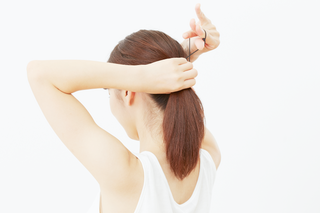If you’ve ever heard the heart-sinking snap of a strand of hair while brushing or styling your tresses, you know it’s a big deal. But why does it happen? Your hair’s elasticity (or lack thereof) could be to blame. Here’s what hair elasticity is and why it matters.
What Is Hair Elasticity?
How Do I Know If My Hair Has Low Elasticity?
Why Does Elasticity Matter?
So What Can You Do?
Fortunately, there are tried-and-true ways to increase your hair’s elasticity.
- Pay attention to your hair routine. Don’t wash every day, since that strips your hair of its protective natural oils. And never skip conditioning your hair. It’s vital to help your hair cuticles seal after you shampoo.
- Avoid heat. Your hair needs moisture to retain its elasticity, but heat tools are notorious for pulling moisture out of your hair. If you suspect that your hair has low elasticity, it’s worth switching to air drying your hair, rather than using a blow dryer, and taking a break from heat styling. We have some great no-heat style suggestions here.
- Nourish your hair from the inside out. Be sure to eat plenty of hair-healthy foods, like eggs, salmon, nuts, berries, leafy greens, sweet potatoes, avocados, oysters, and beans. That way, your hair has the building-blocks it needs to grow and stay elastic and strong.
- Use rice water. Did you know that rice water has been shown to increase hair elasticity? That’s because it contains a key nutrient called inositol, which strengthens your hair. Plus, it has tons of vitamins and minerals, too. In fact, the Red Yao credit their legendary strong, long hair to their hair care routine of washing it in Longsheng rice water. And now, you can get the benefits of that same Longsheng rice water in every bar of Viori.
Losing elasticity is a common problem. Everything from your diet, to your hair care routine, to natural elements like sun and wind can impact your hair’s elasticity. Fortunately, with a little TLC, you can restore elasticity to your hair.
Has Viori helped your hair regain its elasticity? We’d love to hear about it! Leave a review here.
